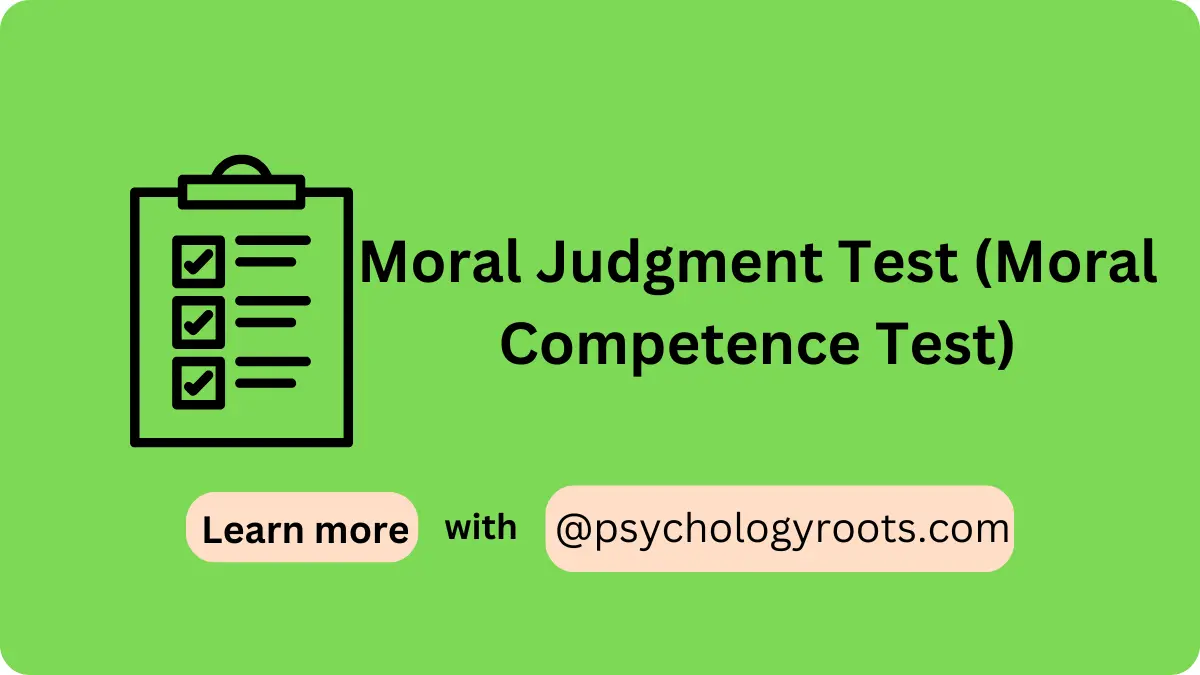Table of Contents
Moral Judgment Test (Moral Competence Test)
Here in this post, we are sharing the “Moral Judgment Test (Moral Competence Test)”. You can read psychometric and Author information. We have thousands of Scales and questionnaires in our collection (See Scales and Questionnaires). You can demand us any scale and questionnaires related to psychology through our community, and we will provide you with a short time. Keep visiting Psychology Roots.
About Moral Judgment Test (Moral Competence Test)
Scale Name
Moral Judgment Test (Moral Competence Test)
Author Details
Georg Lind
Translation Availability

Background/Description
The Moral Judgment Test (MJT), now commonly known as the Moral Competence Test (MCT), was developed by Georg Lind to objectively assess an individual’s ability to make moral judgments based on ethical reasoning rather than simply measuring moral values. The MCT is structured to evaluate moral competence, defined as the capacity to resolve moral conflicts through principles rather than emotional bias. The tool is unique because it uses a two-dimensional approach, assessing moral judgment and moral competence separately.
This tool has been used in diverse fields, including education, psychology, and social sciences, providing insights into moral development across different age groups and cultural contexts.
Administration, Scoring and Interpretation
- Participants are given hypothetical moral dilemmas followed by arguments for and against various decisions within these dilemmas.
- They rate each argument’s acceptability based on their level of agreement.
Reliability and Validity
- Reliability: The MCT has demonstrated strong reliability across various studies and cultural contexts, with scores showing consistency in moral reasoning competencies.
- Validity: Multiple studies have validated the MCT, showing that it effectively distinguishes moral competence levels among individuals and is sensitive to developmental changes in moral reasoning.
Available Versions
Multiple-Items
Reference
Lind, G. (1985). Inhalt und Struktur des moralischen Urteilens. Ansätze und Ergebnisse der” Just Community”-Schule. Die Deutsche Schule, 1, 4-12.
Lind, G. (2019). How to teach moral competence. Logos Verlag Berlin GmbH.
Lind, G. (2021). Making human traits visible, objectively and validly, through experimentally designed questionnaires. Ethics in Progress, 12(1), 15-38.
Important Link
Scale File:
Frequently Asked Questions
What does the MCT measure?
It measures moral competence, focusing on an individual’s ability to resolve moral conflicts through principled reasoning.
Is the MCT culturally adaptable?
Yes, it has been adapted and validated across different cultures, providing reliable results globally.
How is the MCT different from other moral judgment tests?
Unlike tests measuring moral values, the MCT assesses the consistency and reasoning behind moral judgments, emphasizing competence rather than content.
Who can benefit from the MCT?
Educators, psychologists, and researchers aiming to study or improve moral competence and ethical decision-making skills can greatly benefit from this tool.
How long does the MCT take to complete?
The test is relatively brief, typically completed within 15–30 minutes.
Disclaimer
Please note that Psychology Roots does not have the right to grant permission for the use of any psychological scales or assessments listed on its website. To use any scale or assessment, you must obtain permission directly from the author or translator of the tool. Psychology Roots provides information about various tools and their administration procedures, but it is your responsibility to obtain proper permissions before using any scale or assessment. If you need further information about an author’s contact details, please submit a query to the Psychology Roots team.
Help Us Improve This Article
Have you discovered an inaccuracy? We put out great effort to give accurate and scientifically trustworthy information to our readers. Please notify us if you discover any typographical or grammatical errors.
Make a comment. We acknowledge and appreciate your efforts.
Share With Us
If you have any scale or any material related to psychology kindly share it with us at psychologyroots@gmail.com. We help others on behalf of you.